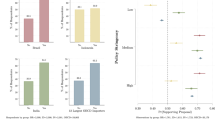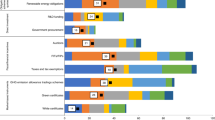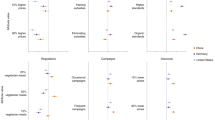Abstract
Despite increasing their consumption footprints, high-income countries have improved domestic environmental and labour conditions. This incongruity is enabled by international trade, dissociating consumption benefits from adverse production impacts. However, political debates on new regulation to make environmental and labour practices more sustainable throughout companies’ global supply chains have emerged in the Global North. While shifting public sentiment towards regulating global business practices could place sustainability on the policy agenda forefront, citizen support for such policies remains under-identified. Here we explore dimensions of citizen support for global supply chain regulations via survey-embedded experiments. We find that citizens prefer strong reporting requirements and enforcement capabilities across the 12 largest OECD (Organisation for Economic Co-operation and Development) importing countries (N = 24,003). Further, such policy preferences are driven by environmental attitudes and political ideology, and are robust against pro-/anti-market informational manipulation. These results suggest substantial, cross-national public opinion mandates for policy interventions to make global supply chains more transparent. From a sustainability perspective, this is an a priori encouraging finding as it implies that over the last decade, public opinion on this emerging policy topic has matured. Consequently, political actors have an incentive to situate the subject prominently on their policy programmes.
This is a preview of subscription content, access via your institution
Access options
Access Nature and 54 other Nature Portfolio journals
Get Nature+, our best-value online-access subscription
$29.99 / 30 days
cancel any time
Subscribe to this journal
Receive 12 digital issues and online access to articles
$119.00 per year
only $9.92 per issue
Buy this article
- Purchase on Springer Link
- Instant access to full article PDF
Prices may be subject to local taxes which are calculated during checkout






Similar content being viewed by others
Data availability
Data replication materials are publicly available on Harvard Dataverse at https://doi.org/10.7910/DVN/URL6A4.
Code availability
Code replication materials are publicly available on Harvard Dataverse at https://doi.org/10.7910/DVN/URL6A4.
References
Wiedmann, T., Lenzen, M., Keyßer, L. T. & Steinberger, J. K. Scientists’ warning on affluence. Nat. Commun. 11, 3107 (2020).
Kolcava, D., Rudolph, L. & Bernauer, T. Voluntary business initiatives can reduce public pressure for regulating firm behaviour abroad. J. Eur. Public Policy 28, 591–614 (2021).
Rudolph, L., Kolcava, D. & Bernauer, T. Public demand for extraterritorial environmental and social public goods provision. Br. J. Polit. Sci. https://doi.org/10.1017/S0007123422000175 (2022).
Amengual, M. & Bartley, T. Global markets, corporate assurances, and the legitimacy of state intervention: perceptions of distant labor and environmental problems. Am. Sociol. Rev. 87, 383–414 (2022).
Keohane, R. O. & Victor, D. G. Cooperation and discord in global climate policy. Nat. Clim. Change 6, 570–575 (2016).
Barrett, S. Dikes versus windmills: climate treaties and adaptation. Clim. Change Econ. 11, 2040005 (2020).
van der Ven, H. Beyond Greenwash? Explaining Credibility in Transnational Eco-Labeling (Oxford Univ. Press, 2019).
Cory, J., Lerner, M. & Osgood, I. Supply chain linkages and the extended carbon coalition. Am. J. Polit. Sci. 65, 69–87 (2021).
Österblom, H., Bebbington, J., Blasiak, R., Sobkowiak, M. & Folke, C. Transnational corporations, biosphere stewardship, and sustainable futures. Annu. Rev. Environ. Resour. 47, https://doi.org/10.1146/annurev-environ-120120-052845 (2022).
Wackernagel, M. et al. The importance of resource security for poverty eradication. Nat. Sustain. 4, 731–738 (2021).
Folke, C. et al. Transnational corporations and the challenge of biosphere stewardship. Nat. Ecol. Evol. 3, 1396–1403 (2019).
Ruggie, J. G. Multinationals as global institution: power, authority and relative autonomy. Regul. Gov. 12, 317–333 (2018).
LeBaron, G. & Lister, J. The hidden costs of global supply chain solutions. Rev. Int. Polit. Econ. 29, 669–695 (2021).
Reid, E. M. & Toffel, M. W. Responding to public and private politics: corporate disclosure of climate change strategies. Strateg. Manage. J. 30, 1157–1178 (2009).
Wlezien, C. The public as thermostat: dynamics of preferences for spending. Am. J. Polit. Sci. 39, 981–1000 (1995).
Hager, A. & Hilbig, H. Does public opinion affect political speech? Am. J. Polit. Sci. 64, 921–937 (2020).
Wendling, Z., Emerson, J. W., de Sherbinin, A. & Esty, D. C. Environmental Performance Index 2020 (Yale Center for Environmental Law & Policy, 2020).
Maestre-Andrés, S., Drews, S., Savin, I. & van den Bergh, J. Carbon tax acceptability with information provision and mixed revenue uses. Nat. Commun. 12, 7017 (2021).
Trade Map, Trade Statistics For International Business Development 2001–2020 (International Trade Centre, 2020); https://www.trademap.org
Hainmueller, J., Hopkins, D. & Yamamoto, T. Causal inference in conjoint analysis: understanding multidimensional choices via stated preference experiments. Polit. Anal. 22, 1–30 (2014).
Leeper, T. J., Hobolt, S. B. & Tilley, J. Measuring subgroup preferences in conjoint experiments. Polit. Anal. 28, 207–221 (2020).
Givoni, M., Macmillen, J., Banister, D. & Feitelson, E. From Policy Measures to Policy Packages. Transp. Rev. 33, 1–20 (2013).
ISSP Research Group. International Social Survey Programme: Environment III-ISSP 2010 (GESIS, 2010); https://doi.org/10.4232/1.13271
Murphy, R. O., Ackermann, K. A. & Handgraaf, M. J. J. Measuring social value orientation. Judgm. Decis. Mak. 6, 771–781 (2011).
Whitmarsh, L., Xenias, D. & Jones, C. R. Framing effects on public support for carbon capture and storage. Palgrave Commun. 5, 17 (2019).
Meemken, E.-M. et al. Sustainability standards in global agrifood supply chains. Nat. Food 2, 758–765 (2021).
De Vries, C. E., Hobolt, S. B. & Walter, S. Politicizing international cooperation: the mass public, political entrepreneurs, and political opportunity structures. Int. Organ. 75, 306–332 (2021).
Nevett, J. How green politics are changing Europe. BBC News (October 2021).
Grossman, G. M. & Helpman, E. Interest Groups and Trade Policy (Princeton Univ. Press, 2020).
Hagman, W., Erlandsson, A., Dickert, S., Tinghög, G. & Västfjäll, D. The effect of paternalistic alternatives on attitudes toward default nudges. Behav. Public Policy 6, 95–118 (2022).
Sunstein, C. R. Ruining popcorn? The welfare effects of information. J. Risk Uncertain. 58, 121–142 (2019).
Heyes, A., Kapur, S., Kennedy, P. W., Martin, S. & Maxwell, J. W. But what does it mean? Competition between products carrying alternative green labels when consumers are active acquirers of information. J. Assoc. Environ. Resour. Econ. 7, 243–277 (2020).
Reisch, L. A., Sunstein, C. R. & Kaiser, M. What do people want to know? Information avoidance and food policy implications. Food Policy 102, 102076 (2021).
Sunstein, C. R. Too Much Information: Understanding What You Don’t Want to Know (MIT Press, 2020).
LeBaron, G. & Rühmkorf, A. The domestic politics of corporate accountability legislation: struggles over the 2015 UK Modern Slavery Act. Socioecon. Rev. 17, 709–743 (2019).
Gardner, T. A. et al. Transparency and sustainability in global commodity supply chains. World Dev. 121, 163–177 (2019).
Cammelli, F., Levy, S. A., Grabs, J., Valentim, J. F. & Garrett, R. D. Effectiveness-equity tradeoffs in enforcing exclusionary supply chain policies: lessons from the Amazonian cattle sector. J. Clean. Prod. 332, 130031 (2022).
Cornesse, C. et al. A review of conceptual approaches and empirical evidence on probability and nonprobability sample survey research. J. Surv. Stat. Methodol. 8, 4–36 (2020).
Clifford, S., Sheagley, G. & Piston, S. Increasing precision without altering treatment effects: repeated measures designs in survey experiments. Am. Polit. Sci. Rev. 115, 1048–1065 (2021).
Bansak, K., Hainmueller, J., Hopkins, D. J. & Yamamoto, T. in Advances in Experimental Political Science (eds Green, D. P. & Druckman, J. N.) 19–41 (Cambridge Univ. Press, 2021).
Beiser-McGrath, L. F. & Bernauer, T. Could revenue recycling make effective carbon taxation politically feasible? Sci. Adv. 5, eaax3323 (2019).
Haufler, V. Disclosure as governance: the extractive industries transparency initiative and resource management in the developing world. Glob. Environ. Polit. 10, 53–73 (2010).
Héritier, A. & Eckert, S. New modes of governance in the shadow of hierarchy: self-regulation by industry in Europe. J. Public Policy 28, 113–138 (2008).
Malhotra, N., Monin, B. & Tomz, M. Does private regulation preempt public regulation? Am. Polit. Sci. Rev. 113, 19–37 (2019).
McDonnell, M.-H., King, B. G. & Soule, S. A. A dynamic process model of private politics: activist targeting and corporate receptivity to social challenges. Am. Sociol. Rev. 80, 654–678 (2015).
Kinderman, D. Time for a reality check: is business willing to support a smart mix of complementary regulation in private governance? Policy Soc. 35, 29–42 (2016).
Holgado-Tello, F. P., Chacón-Moscoso, S., Barbero-García, I. & Vila-Abad, E. Polychoric versus Pearson correlations in exploratory and confirmatory factor analysis of ordinal variables. Qual. Quant. 44, 153–166 (2010).
Russell, D. W. In search of underlying dimensions: the use (and abuse) of factor analysis in personality and social psychology bulletin. Personal. Soc. Psychol. Bull. 28, 1629–1646 (2002).
Harbaugh, R., Maxwell, J. W. & Roussillon, B. Label confusion: the Groucho effect of uncertain standards. Manage. Sci. 57, 1512–1527 (2011).
Acknowledgements
We thank J. Bognar, M. Brander, G. Brückmann, J. Freihardt, S. Gomm, M. Huss, V. Koubi, F. Lichtin, D. Presberger, F. Quoss and S. Rhein for valuable feedback on the research design and the survey instrument. S. Amberg provided valuable research assistance. A. Uji, D. H. Shin, J. Schuur, M. M. Munoz, P. Tromp and B. Clément helped us with the survey translations. F. Genovese, M. Lerner and seminar audiences at the London School of Economics and Political Science as well as participants of the European Political Science Association Conference, Environmental Politics and Governance Conference, International Studies Association Conference, and the Swiss Political Science Association Conference provided helpful comments on draft versions. This research was supported by the Swiss National Science Foundation (SNSF) within the framework of the National Research Programme ‘Sustainable Economy: resource-friendly, future-oriented, innovative’ (NRP 73 Grant: 407340−172363, T.B.) and by SNSF grant 100017−17590722 (T.B.) ‘Environmental Burden-Shifting Through International Trade: Driving Forces and Policy Implications’.
Author information
Authors and Affiliations
Contributions
D.K. and E.K.S. collected the data, developed and analysed the results, and co-wrote the manuscript. D.K., E.K.S. and T.B. contributed to the research design, drafting and revising of the manuscript.
Corresponding author
Ethics declarations
Competing interests
The authors declare no competing interests.
Peer review
Peer review information
Nature Sustainability thanks Joerg S. Hofstetter, Nicolas Jager and the other, anonymous, reviewer(s) for their contribution to the peer review of this work.
Additional information
Publisher’s note Springer Nature remains neutral with regard to jurisdictional claims in published maps and institutional affiliations.
Supplementary information
Supplementary Information
Supplementary Figs. 1–5 and Tables 1–12.
Rights and permissions
Springer Nature or its licensor holds exclusive rights to this article under a publishing agreement with the author(s) or other rightsholder(s); author self-archiving of the accepted manuscript version of this article is solely governed by the terms of such publishing agreement and applicable law.
About this article
Cite this article
Kolcava, D., Smith, E.K. & Bernauer, T. Cross-national public acceptance of sustainable global supply chain policy instruments. Nat Sustain 6, 69–80 (2023). https://doi.org/10.1038/s41893-022-00984-8
Received:
Accepted:
Published:
Issue Date:
DOI: https://doi.org/10.1038/s41893-022-00984-8
This article is cited by
-
Stringent sustainability regulations for global supply chains are supported across middle-income democracies
Nature Communications (2024)
-
Revealing product supply chains
Nature Sustainability (2022)



